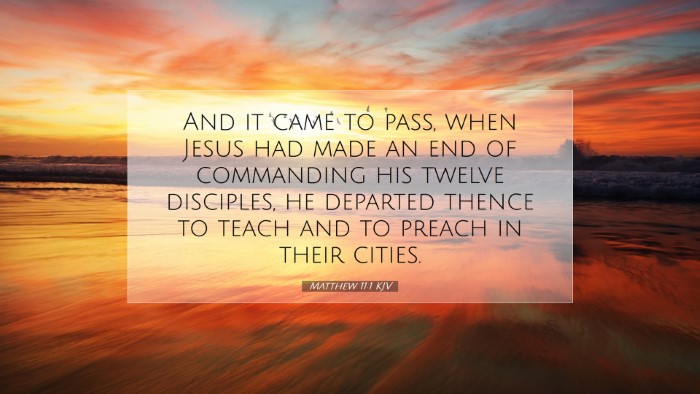Commentary on Matthew 11:1
Verse Text: "And it came to pass, when Jesus had made an end of commanding his twelve disciples, he departed thence to teach and to preach in their cities."
Introduction
The Gospel of Matthew presents a comprehensive account of the life and teachings of Jesus Christ. Chapter 11 represents a pivotal transition in His ministry, where after giving instructions to His disciples, He continues His mission of teaching and preaching. This commentary aims to delve deeper into the implications of this verse, drawing insights from esteemed public domain resources such as Matthew Henry, Albert Barnes, and Adam Clarke.
Matthew Henry's Commentary
Henry emphasizes the importance of this transition. "When Jesus had made an end of commanding his twelve disciples," is not just a mere statement of chronology but highlights the completion of a significant phase of preparation in the ministry of Christ. The act of "commanding" indicates that Jesus provided His disciples with specific instructions, imparting His authority to them as they were sent out to evangelize.
Henry notes that following this, "he departed thence," suggests a deliberate movement on Jesus’ part, which is crucial as it shows that His ministry was not confined to one location. He took His teachings beyond the Galilean region, indicating the expansive nature of His mission. Henry asserts that this step signifies Christ's intention to spread the gospel to a broader audience and provides an example for church leaders to follow in their own pastoral duties.
Albert Barnes' Insights
Barnes elaborates on the context in which Jesus conducted His ministry. He underscores that after sending out His disciples, Jesus Himself went forth to "teach and to preach." This illustrates the dual role of Jesus as both a teacher and a preacher, a model that should be reflected in contemporary ministry.
He notes that the terms "teach" and "preach" represent two facets of communication: teaching denotes instruction and depth, while preaching conveys the urgency and proclamation of the gospel. Barnes emphasizes the necessity for ministers today to maintain a balance between these two aspects, ensuring that their instruction is not only theological but also practical and applicable to life.
Barnes on "Their Cities"
Barnes highlights the phrase "in their cities," explaining that Jesus’ ministry was localized yet targeted. This indicates that Christ was mindful of the specific needs and dynamics of each community. He reached out to them in their context, suggesting that effective ministry must also be contextualized. The application for modern pastors is clear: understanding and ministering to the specific needs of the community is crucial.
Adam Clarke's Exposition
Clarke brings a nuanced perspective regarding the disciples' commissioning and the subsequent actions of Jesus. He notes that the act of commanding His disciples was preparatory for their own ministries, establishing a foundation upon which they would build. Jesus' departure to preach further illustrates the nature of His ministry, as Clarke points out that "the work of Christ does not cease with the preparation of His followers but expands into the wider world."
Clarke also observes the significance of the phrase "made an end." This implies a conclusion but also the initiation of a continual process. Effective ministry involves ongoing learning and growth, and Clarke urges contemporary scholars and pastors to follow suit—always seeking to better prepare themselves and those they lead for the tasks at hand.
Theological Implications
The shift from the instruction of the disciples to the active ministry of Jesus showcases a model for pastoral leadership that intertwines preparation with action. In this passage, several theological implications emerge:
- Delegated Authority: Jesus delegated authority to His disciples, indicating the importance of equipping others for ministry. Leaders today should invest in training and empowering those within their congregations.
- Holistic Ministry: The dual focus on teaching and preaching signifies that ministry should engage the mind as well as the heart. Pastors should strive to offer both sound doctrine and impactful preaching.
- Localized Outreach: Jesus’ attention to "their cities" emphasizes the need for churches to understand and cater to their local context, ensuring relevant and meaningful ministry.
- Continuity of Mission: The flow from Christ to His disciples demonstrates the organic continuity of mission, inviting the church to see its role as part of the ongoing work of the Holy Spirit.
Practical Applications
This verse serves as a reminder for modern-day ministers and theologians to focus on a few key areas:
- Preparation for Ministry: Continuous learning and intentional training should be part of the life of every leader.
- Effective Communication: Striving for a balance between teaching and preaching that resonates with the audience is crucial for impactful ministry.
- Community Engagement: An urgent call to engage with and understand the specific spiritual needs and challenges of their respective communities.
- Mission-Oriented Approach: Recognizing that the work of the church is ongoing reflects a commitment to evangelism that transcends geographical and cultural boundaries.
Conclusion
Matthew 11:1 serves as a distinctive reminder of the dynamic interplay between teaching and preaching in the ministry of Jesus. The insights drawn from public domain commentaries provide a profound resource for pastors, students, and theologians, emphasizing the importance of preparation, effective communication, community engagement, and a mission-oriented approach to ministry. As we reflect on this verse, we are encouraged to recommit ourselves to the call of Christ, to continue the work He began, and to embrace the responsibility of making disciples in our own "cities."


